formerly eScholarship Editions


|
|
|
|
Your search for
'Philosophy' in subject
found 100 book(s). | Modify Search | Displaying 81 - 100 of 100 book(s) | |
| 81. |  | Title: Shame and necessity Author: Williams, Bernard Arthur Owen Published: University of California Press, 1993 Subjects: Philosophy | Ethics | Classics | Classical Philosophy | Literary Theory and Criticism Publisher's Description: We tend to suppose that the ancient Greeks had primitive ideas of the self, of responsibility, freedom, and shame, and that now humanity has advanced from these to a more refined moral consciousness. Bernard Williams's original and radical book questions this picture of Western history. While we are in many ways different from the Greeks, Williams claims that the differences are not to be traced to a shift in these basic conceptions of ethical life. We are more like the ancients than we are prepared to acknowledge, and only when this is understood can we properly grasp our most important differences from them, such as our rejection of slavery.The author is a philosopher, but much of his book is directed to writers such as Homer and the tragedians, whom he discusses as poets and not just as materials for philosophy. At the center of his study is the question of how we can understand Greek tragedy at all, when its world is so far from ours.Williams explains how it is that when the ancients speak, they do not merely tell us about themselves, but about ourselves. Shame and Necessity gives a new account of our relations to the Greeks, and helps us to see what ethical ideas we need in order to live in the modern world. [brief] Similar Items |
| 82. |  | Title: Solidarity of strangers: feminism after identity politics Author: Dean, Jodi 1962- Published: University of California Press, 1996 Subjects: Gender Studies | Postcolonial Studies | Women's Studies | Politics | Philosophy Publisher's Description: Solidarity of Strangers is a crucial intervention in feminist, multicultural, and legal debates that will ignite a rethinking of the meaning of difference, community, and participatory democracy. Arguing for a solidarity rooted in a respect for difference, Dean offers a broad vision of the shape of . . . [more] Similar Items |
| 83. |  | Title: Songs without music: aesthetic dimensions of law and justice Author: Manderson, Desmond Published: University of California Press, 2000 Subjects: Law | Philosophy | Ethics | Social and Political Thought | Intellectual History Publisher's Description: In this pathbreaking and provocative analysis of the aesthetics of law, the historian, legal theorist, and musician Desmond Manderson argues that by treating a text, legal or otherwise, as if it were merely a sequence of logical propositions, readers miss its formal and symbolic meanings. Creatively using music as a model, he demonstrates that law is not a sterile, rational structure, but a cultural form to be valued and enhanced through rhetoric and metaphors, form, images, and symbols. To further develop this argument, the book is divided into chapters, each of which is based on a different musical form. Law, for Manderson, should strive for neither coherence nor integrity. Rather, it is imperfectly realized, constantly reinterpreted, and always in flux. Songs without Music is written in an original, engaging, and often humorous style, and exhibits a deep knowledge of both law and music. It successfully traverses several disciplines and builds an original and persuasive argument for a legal aesthetic. The book will appeal to a broad readership in law, political theory, literary criticism, and cultural studies. [brief] Similar Items |
| 84. | 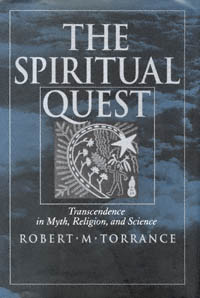 | Title: The spiritual quest: transcendence in myth, religion, and science Author: Torrance, Robert M. (Robert Mitchell) 1939- Published: University of California Press, 1994 Subjects: Religion | Indigenous Religions | Cultural Anthropology | Folklore and Mythology | Language and Linguistics | Philosophy | History and Philosophy of Science | Literature Publisher's Description: Robert Torrance's wide-ranging, innovative study argues that the spiritual quest is rooted in our biological, psychological, linguistic, and social nature. The quest is not, as most have believed, a rare mystical experience, but a frequent expression of our most basic human impulses. Shaman and scientist, medium and poet, prophet and philosopher, all venture forth in quest of visionary truths to transform and renew the world.Yet Torrance is not trying to reduce the quest to an "archetype" or "monomyth." Instead, he presents the full diversity of the quest in the myths and religious practices of tribal peoples throughout the world, from Oceania to India, Africa, Siberia, and especially the Americas. In theorizing about the quest, Torrance draws on thinkers as diverse as Bergson and Piaget, van Gennep and Turner, Pierce and Popper, Freud, Darwin, and Chomsky. This is a book that will expand our knowledge - and awareness - of a fundamental human activity in all its fascinating complexity. [brief] Similar Items |
| 85. | 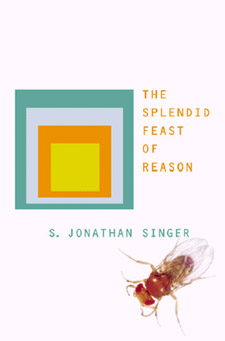 | Title: The splendid feast of reason Author: Singer, Seymour Jonathan 1924- Published: University of California Press, 2001 Subjects: Science | History of Science | Philosophy Publisher's Description: Jonathan Singer's witty, erudite book is a celebration of rationality and an urgent call to make use of intelligence and reason to better cope with human problems. Emphasizing the importance of rationality's greatest achievement, modern science, Singer - one of the foremost biologists of our era - argues that for the first time in several million years humanity has at its disposal the tools for an objective understanding of the external world. Singer demonstrates that, today more than ever, the fullest exercise of rationality is essential if humanity is to rein in a runaway technology and control an explosion of the human population that together threaten to devastate life on this planet within only a few more generations. The intrusion of reason and rationality into our largely irrational world has been painfully slow, uneven, and often unwelcome. Singer explains that for rationalists the founding of modern science - which took place only a few hundred years ago - has overthrown many of the myths of conventional wisdom and dogmas of traditional religions. Yet these beliefs still hold sway over the irrational world, obstructing efforts to deal sensibly with the problematic future of mankind. The core of The Splendid Feast of Reason is an engaging and accessible account of the knowledge that modern science provides. Singer offers an absorbing discussion of how life works, of the nature of reproduction, aging, and death, and of the necessary fragility of the individual life compared to the resilience of life itself. He emphasizes the primary role of the genes in determining the structural organization and the behaviors of living things, including humans. He also stresses the nature and mechanisms of biological evolution, mechanisms that have now been placed in jeopardy because of human ignorance and irrational appetites. Finally, Singer delves into the enigma of the real world with its irrational and chaotic operations and offers suggestions of how a rationalist can not only survive, but thrive in it. [brief] Similar Items |
| 86. | 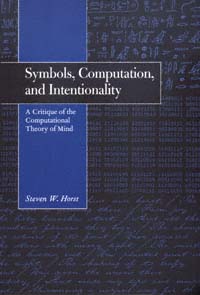 | Title: Symbols, computation, and intentionality: a critique of the computational theory of mind Author: Horst, Steven W 1960- Published: University of California Press, 1996 Subjects: Philosophy | Social and Political Thought | Psychology Publisher's Description: The computational theory of mind - the belief that the mind can be likened to a computer and that cognitive states possess the generative and compositional properties of natural languages - has proven enormously influential in recent philosophical studies of cognition. In this carefully argued critique, Steven Horst pronounces the theory deficient. He refutes its claims and assumptions, particularly the assertion that symbolic representations need not have conventional meaning. Horst goes on to sketch a new methodology for looking at the philosophy of psychology, one that provides a more fruitful way of comparing computational psychology with rival views emerging from connectionism and neuroscience. Original and comprehensive, his book is certain to provoke controversy and stimulate debate. [brief] Similar Items |
| 87. | 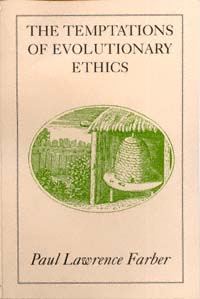 | Title: The temptations of evolutionary ethics Author: Farber, Paul Lawrence 1944- Published: University of California Press, 1994 Subjects: Philosophy | History | Ethics | History and Philosophy of Science Publisher's Description: Evolutionary theory tells us about our biological past; can it also guide us to a moral future? Paul Farber's compelling book describes a century-old philosophical hope held by many biologists, anthropologists, psychologists, and social thinkers: that universal ethical and social imperatives are built into human nature and can be discovered through knowledge of evolutionary theory.Farber describes three upsurges of enthusiasm for evolutionary ethics. The first came in the early years of mid-nineteenth century evolutionary theories; the second in the 1920s and '30s, in the years after the cultural catastrophe of World War I; and the third arrived with the recent grand claims of sociobiology to offer a sound biological basis for a theory of human culture.Unlike many who have written on evolutionary ethics, Farber considers the responses made by philosophers over the years. He maintains that their devastating criticisms have been forgotten - thus the history of evolutionary ethics is essentially one of oft-repeated philosophical mistakes.Historians, scientists, social scientists, and anyone concerned about the elusive basis of selflessness, altruism, and morality will welcome Farber's enlightening book. [brief] Similar Items |
| 88. | 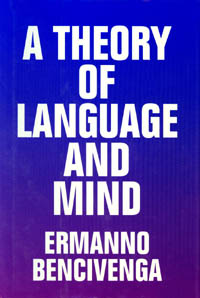 | Title: A theory of language and mind Author: Bencivenga, Ermanno 1950- Published: University of California Press, 1997 Subjects: Philosophy Publisher's Description: In his most recent book, Ermanno Bencivenga offers a stylistically and conceptually exciting investigation of the nature of language, mind, and personhood and the many ways the three connect. Bencivenga, one of the most iconoclastic voices to emerge in contemporary American philosophy, contests the basic assumptions of analytic (and also, to an extent, postmodern) approaches to these topics. His exploration leads through fascinating discussions of education, courage, pain, time and history, selfhood, subjectivity and objectivity, reality, facts, the empirical, power and transgression, silence, privacy and publicity, and play - all themes that are shown to be integral to our thinking about language. Relentessly bending the rules, Bencivenga frustrates our expectations of a "proper" theory of language. He invokes the transgressions of Nietzsche and Wittgenstein even as he appropriates the aphoristic style of Wittgenstein's Tractatus . Written in a philosophically playful and experimental mode, A Theory of Language and Mind draws the reader into a sense of continual surprise, therapeutic discomfort, and discovery. [brief] Similar Items |
| 89. | 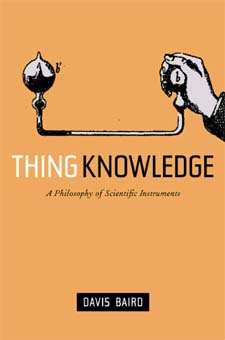 | Title: Thing knowledge: a philosophy of scientific instruments Author: Baird, Davis Published: University of California Press, 2004 Subjects: Philosophy | Technology and Society Publisher's Description: Western philosophers have traditionally concentrated on theory as the means for expressing knowledge about a variety of phenomena. This absorbing book challenges this fundamental notion by showing how objects themselves, specifically scientific instruments, can express knowledge. As he considers numerous intriguing examples, Davis Baird gives us the tools to "read" the material products of science and technology and to understand their place in culture. Making a provocative and original challenge to our conception of knowledge itself, Thing Knowledge demands that we take a new look at theories of science and technology, knowledge, progress, and change. Baird considers a wide range of instruments, including Faraday's first electric motor, eighteenth-century mechanical models of the solar system, the cyclotron, various instruments developed by analytical chemists between 1930 and 1960, spectrometers, and more. [brief] Similar Items |
| 90. | 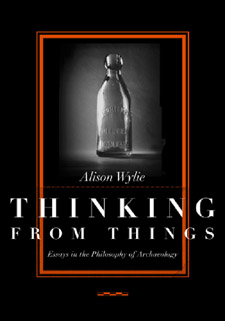 | Title: Thinking from things: essays in the philosophy of archaeology Author: Wylie, Alison Published: University of California Press, 2002 Subjects: Philosophy | Archaeology | History of Science Publisher's Description: In this long-awaited compendium of new and newly revised essays, Alison Wylie explores how archaeologists know what they know. Examining the history and methodology of Anglo-American archaeology, Wylie puts the tumultuous debates of the last thirty years in historical and philosophical perspective. Similar Items |
| 91. | 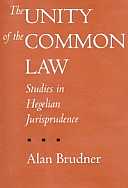 | Title: The unity of the common law: studies in Hegelian jurisprudence Author: Brudner, Alan Published: University of California Press, 1995 Subjects: Philosophy | Law | Social and Political Thought | Political Theory Publisher's Description: Countering the influential view of Critical Legal Studies that law is an incoherent mixture of conflicting political ideologies, this book forges a new paradigm for understanding the common law as being unified and systematic. Alan Brudner applies Hegel's legal and moral philosophy to fashion a comprehensive synthesis of the common law of property, contract, tort, and crime.At a time when there is a strong tendency among scholars to view the common law as essentially fragmentary, inconsistent, and contradictory, Brudner suggests instead a coherence that synthesizes several interrelated dichotomies: good-centered and right-based legal paradigms, instrumental and non-instrumental conceptions of law, externalist and internalist interpretations of the common law system, and communitarian and individualist attempts to found the legal enterprise.Brudner covers genuinely new ground through an interpretation of the common law from the standpoint of Hegelian legal philosophy. His unifying notion of common law corresponds to Hegel's notion of Geist , suggesting a designation of the mutual dependence of the community and the atomistic self for their confirmation as ends. [brief] Similar Items |
| 92. | 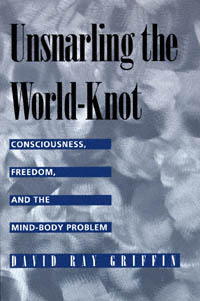 | Title: Unsnarling the world-knot: consciousness, freedom, and the mind-body problem Author: Griffin, David Ray 1939- Published: University of California Press, 1998 Subjects: Philosophy | Intellectual History Publisher's Description: The mind-body problem, which Schopenhauer called the "world-knot," has been a central problem for philosophy since the time of Descartes. Among realists - those who accept the reality of the physical world - the two dominant approaches have been dualism and materialism, but there is a growing consensus that, if we are ever to understand how mind and body are related, a radically new approach is required.David Ray Griffin develops a third form of realism, one that resolves the basic problem (common to dualism and materialism) of the continued acceptance of the Cartesian view of matter. In dialogue with various philosophers, including Dennett, Kim, McGinn, Nagel, Seager, Searle, and Strawson, Griffin shows that materialist physicalism is even more problematic than dualism. He proposes instead a pan-experientialist physicalism grounded in the process philosophy of Alfred North Whitehead. Answering those who have rejected "pan-psychism" as obviously absurd, Griffin argues compellingly that pan-experientialism, by taking experience and spontaneity as fully natural, can finally provide a naturalistic account of the emergence of consciousness - an account that also does justice to the freedom that we all presuppose in practice. [brief] Similar Items |
| 93. | 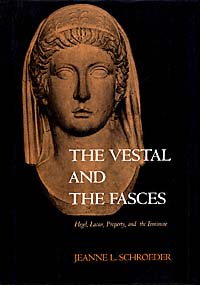 | Title: The vestal and the fasces: Hegel, Lacan, property, and the feminine Author: Schroeder, Jeanne Lorraine Published: University of California Press, 1998 Subjects: Law | Philosophy | Gender Studies Publisher's Description: In this feminist exploration of the erotics of the marketplace, Hegel's notion of property and Lacan's idea of the phallus serve parallel functions in creating the subjectivity necessary for self-actualization. Subjectivity requires intersubjective relationships mediated through a regime of possessing, enjoying, and exchanging an object of desire. For Hegel, this regime is property; for Lacan, it is sexuality, symbolized by the Phallus, which we conflate with the male organ and the female body. Property law, in Jeanne Schroeder's account, is implicitly figured by similar anatomical metaphors for that which men wish to possess and that which women try to be and enjoy. This is reflected in imagery taken from ancient Rome - the axe and bundle of sticks known as the Fasces, and the virgin priestess called the Vestal.Schroeder traces the persistence of phallic metaphors in modern jurisprudence. Rejecting the dominant schools of legal feminism, she reconceptualizes property - the legal relationship as well as its not necessarily material object - as a necessary moment in the human struggle for love and recognition. The Feminine, for Schroeder, is the radical negativity at the heart of both Lacan's split subject and Hegel's concept of freedom. Feminine emancipation and private property are, therefore, equally necessary conditions for the actualization of the free individual and the just society. Feminist scholars, social theorists, political scientists, philosophers, and lawyers will find in Schroeder's analysis scintillating new perspectives on property theory and the feminine within the market and the law. [brief] Similar Items |
| 94. |  | Title: Walter Benjamin, an aesthetic of redemption Author: Wolin, Richard Published: University of California Press, 1994 Subjects: Philosophy | Literary Theory and Criticism Publisher's Description: Few twentieth-century thinkers have proven as influential as Walter Benjamin, the German-Jewish philosopher and cultural and literary critic. Richard Wolin's book remains among the clearest and most insightful introductions to Benjamin's writings, offering a philosophically rich exposition of his complex relationship to Adorno, Brecht, Jewish Messianism, and Western Marxism. Wolin provides nuanced interpretations of Benjamin's widely studied writings on Baudelaire, historiography, and art in the age of mechanical reproduction. In a new Introduction written especially for this edition, Wolin discusses the unfinished Arcades Project , as well as recent tendencies in the reception of Benjamin's work and the relevance of his ideas to contemporary debates about modernity and postmodernity. [brief] Similar Items |
| 95. |  | Title: Walter Benjamin's other history: of stones, animals, human beings, and angels Author: Hanssen, Beatrice Published: University of California Press, 1998 Subjects: Philosophy | Rhetoric | German Studies | Literature Publisher's Description: Long considered to be an impenetrable, hermetic treatise, Walter Benjamin's The Origin of German Tragic Drama has rarely received the attention it deserves as a key text, central to a full understanding of his work. In this critically acclaimed study, distinguished Benjamin scholar Beatrice Hanssen . . . [more] Similar Items |
| 96. | 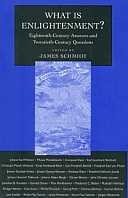 | Title: What is Enlightenment?: eighteenth-century answers and twentieth-century questions Author: Schmidt, James Published: University of California Press, 1996 Subjects: Philosophy | Social and Political Thought | Intellectual History | German Studies Publisher's Description: This collection contains the first English translations of a group of important eighteenth-century German essays that address the question, "What is Enlightenment?" The book also includes newly translated and newly written interpretive essays by leading historians and philosophers, which examine the origins of eighteenth-century debate on Enlightenment and explore its significance for the present.In recent years, critics from across the political and philosophical spectrum have condemned the Enlightenment for its complicity with any number of present-day social and cultural maladies. It has rarely been noticed, however, that at the end of the Enlightenment, German thinkers had already begun a scrutiny of their age so wide-ranging that there are few subsequent criticisms that had not been considered by the close of the eighteenth century. Among the concerns these essays address are the importance of freedom of expression, the relationship between faith and reason, and the responsibility of the Enlightenment for revolutions.Included are translations of works by such well-known figures as Immanuel Kant, Moses Mendelssohn, Johann Gottlieb Fichte, and Johann Georg Hamann, as well as essays by thinkers whose work is virtually unknown to American readers. These eighteenth-century texts are set against interpretive essays by such major twentieth-century figures as Max Horkheimer, Jürgen Habermas, and Michel Foucault. [brief] Similar Items |
| 97. |  | Title: What price better health?: hazards of the research imperative Author: Callahan, Daniel 1930- Published: University of California Press, 2003 Subjects: Medicine | Philosophy | Public Policy Publisher's Description: The idea that we have an unlimited moral imperative to pursue medical research is deeply rooted in American society and medicine. In this provocative work, Daniel Callahan exposes the ways in which such a seemingly high and humane ideal can be corrupted and distorted into a harmful practice. Medical research, with its power to attract money and political support, and its promise of cures for a wide range of medical burdens, has good and bad sides - which are often indistinguishable. In What Price Better Health?, Callahan teases out the distinctions and differences, revealing the difficulties that result when the research imperative is suffused with excessive zeal, adulterated by the profit motive, or used to justify cutting moral corners. Exploring the National Institutes of Health's annual budget, the inflated estimates of health care cost savings that result from research, the high prices charged by drug companies, the use and misuse of human subjects for medical testing, and the controversies surrounding human cloning and stem cell research, Callahan clarifies the fine line between doing good and doing harm in the name of medical progress. His work shows that medical research must be understood in light of other social and economic needs and how even the research imperative, dedicated to the highest human good, has its limits. [brief] Similar Items |
| 98. | 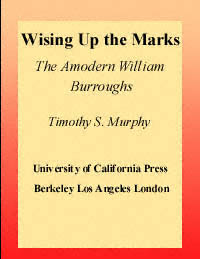 | Title: Wising up the marks: the modern William Burroughs Author: Murphy, Timothy S 1964- Published: University of California Press, 1998 Subjects: Literature | American Studies | Literary Theory and Criticism | Philosophy Publisher's Description: William S. Burroughs is one of the twentieth century's most visible, controversial, and baffling literary figures. In the first comprehensive study of the writer, Timothy S. Murphy places Burroughs in the company of the most significant intellectual minds of our time. In doing so, he gives us an immensely readable and convincing account of a man whose achievements continue to have a major influence on American art and culture. Murphy draws on the work of such philosophers as Gilles Deleuze, Félix Guattari, Theodor Adorno, and Jean-Paul Sartre, and also investigates the historical contexts from which Burroughs's writings arose.From the paranoid isolationism of the Cold War through the countercultural activism of the sixties to the resurgence of corporate and state control in the eighties, Burroughs's novels, films, and music hold a mirror to the American psyche. Murphy coins the term "amodernism" as a way to describe Burroughs's contested relationship to the canon while acknowledging the writer's explicit desire for a destruction of such systems of classification. Despite the popular mythology that surrounds Burroughs, his work has been largely excluded from the academy of American letters. Finally here is a book that presents a solid portrait of a major artistic innovator, a writer who combines aesthetics and politics and who can perform as anthropologist, social goad, or media icon, all with consummate skill. [brief] Similar Items |
| 99. | 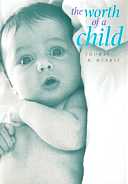 | Title: The worth of a child Author: Murray, Thomas H 1946- Published: University of California Press, 1996 Subjects: Philosophy | Ethics | Medicine | Social Problems | Public Policy Publisher's Description: Thomas Murray's graceful and humane book illuminates one of the most morally complex areas of everyday life: the relationship between parents and children. What do children mean to their parents, and how far do parental obligations go? What, from the beginning of life to its end, is the worth of a child?Ethicist Murray leaves the rarefied air of abstract moral philosophy in order to reflect on the moral perplexities of ordinary life and ordinary people. Observing that abstract moral terms such as altruism and selfishness can be buried in the everyday doings of families, he maintains that ethical theory needs a richer description than it now has of the moral life of parents and children. How far should adults go in their quest for children? What options are available to women who do not want to bear a child now? Should couples be allowed to reject a child because of genetic disability or "wrong" gender? How can we weigh the competing claims of the genetic and the rearing parents to a particular child? The Worth of a Child couples impressive learning with a conversational style. Only by getting down to cases, Murray insists, can we reach moral conclusions that are unsentimental, farsighted, and just. In an era of intense public and private acrimony about the place and meaning of "family values," his practical wisdom about extraordinary difficult moral issues offers compelling reading for both experienced and prospective parents, as well as for ethicists, social and behavioral scientists, and legal theorists. [brief] Similar Items |
| 100. | 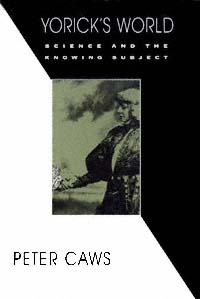 | Title: Yorick's world: science and the knowing subject Author: Caws, Peter Published: University of California Press, 1993 Subjects: Philosophy | History and Philosophy of Science Publisher's Description: Peter Caws provides a fresh and often iconoclastic treatment of some of the most vexing problems in the philosophy of science: explanation, induction, causality, evolution, discovery, artificial intelligence, and the social implications of technological rationality.Caws's work has been shaped equally by the insights of Continental philosophy and a concern with scientific practice. In these twenty-eight essays spanning more than a quarter of a century, he ranges from discussions of the work of French philosopher Gaston Bachelard, to relations between science and surrealism, to the concept of intentionality, to the limits of quantitative description. A lively mix of history, theory, speculation, and analysis, Yorick's World presents a vision of science that includes human history and social life. It will interest professional philosophers and scientists, and at the same time its directness will make it readily accessible to nontechnical readers. [brief] Similar Items |